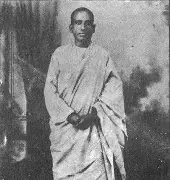சுவாமி விபுலாநந்தர் வாழ்க்கை வரலாறு – தமிழ் கல்வி, இசை மற்றும் சமூகத்தில் அவர் செய்த பங்களிப்புகள்
தமிழ் மொழிக்காகவும், இசைக்கலையின் நுட்பங்களுக்காகவும், சமுதாயப் பணிக்காகவும் தன் வாழ்நாளை அர்ப்பணித்த மாமனிதர் சுவாமி விபுலானந்தர். இவர் ஒரு அறிஞராக மட்டுமல்லாமல், ஓர் ஆசிரியராகவும், சிந்தனையாளராகவும், சமூகப் புரட்சியாளராகவும் திகழ்ந்தார்.
பிறப்பு மற்றும் ஆரம்ப வாழ்வு:
சுவாமி விபுலாநந்தர் இயற்பெயர் மயில்வாகனன். 1892 ஆம் ஆண்டு மார்ச் மாதம் 27ஆம் நாள் இலங்கையின் கிழக்கு மாகாணம், மட்டக்களப்பின் காரைதீவு என்னும் ஊரில் பிறந்தார். தமிழரின் பாரம்பரியம், கலாசாரம், மதம், கல்வி ஆகியவற்றில் இளைஞர்களின் பங்களிப்பை வளர்க்கும் நோக்குடன் வளர்ந்தவர். இவரது பூர்வீகம் மற்றும் காரைதீவின் சமூகச் சூழல் இவரது எண்ணங்களையும் வாழ்க்கைப் பாதையையும் தீர்மானிக்க முக்கிய பங்கு வகித்தன.
கல்வி மற்றும் துறவறம்:
தம் கல்வி பயணத்தின் ஆரம்பத்தில் இருந்தே அறிவியல், இலக்கியம், தத்துவம் ஆகிய அனைத்திலும் ஆழ்ந்த ஆர்வம் கொண்டிருந்தார். ஆனாலும், துறவற வாழ்க்கையே இவருக்குள் ஒரு மாறுபட்ட ஆன்ம சிந்தனையை ஏற்படுத்தியது. அவர்கள் ராமகிருஷ்ண மடத்தில் துறவறம் மேற்கொண்டு, ‘விபுலாநந்தர்’ எனும் ஆன்மீகப் பெயரைப் பெற்றார். ராமகிருஷ்ணர், விவேகானந்தர் போன்றவர்களின் வாழ்க்கை மற்றும் சிந்தனைகள் இவரை ஆழமாகத் தீட்டின.
தமிழ் கல்விக்கும் இசைக்கும் அற்பணித்த வாழ்க்கை:
விபுலாநந்தர் தமிழ் கல்விக்காக தனது வாழ்க்கையை அர்ப்பணித்தவர். 1930-களில் அலுவலகமயமான தமிழ் கல்விக்கு பேராசிரியர் பதவியை பெற்ற இவர், உலகின் முதலாவது தமிழ் பேராசிரியர் என்ற பெருமையை பெற்றார். இவர் ‘யாழ்நூல்’ என்னும் இசை வழிகாட்டி நூலை எழுதி, தமிழ் இசையின் தொன்மத்தை பகுத்து விளக்கியதோடு, மறைந்துபோன இசைக் கருவிகளையும் வாசிப்பை மீண்டும் அறிமுகப்படுத்தினார்.
அவர் எழுதிய ‘மதங்க சூள்மணி’ என்னும் நாடகக் கோட்பாடுகள் பற்றிய நூலும், தமிழில் நாடகம் என்ற கலை வடிவத்தின் வரலாறையும் வழிமுறையையும் ஆராய்கின்ற முக்கியமான ஆவணமாகும். இவருடைய இலக்கியக் கோட்பாடுகள் தொன்மமும் நவீனமும் இணைந்தவை.
சமுதாய சிந்தனைகள்:
சுவாமி விபுலாநந்தர் கல்வியை ஒரு சமூக மாற்றக் கருவியாகக் கையாண்டார். சாதி, மதம், பின்தங்கிய சமூக நிலைகள் போன்றவற்றை சமமாக பார்க்கும் தத்துவத்தைக் கொண்டு அவர் உரையாற்றினார். பெண்கள் கல்வியை ஊக்குவிக்கவும், மாணவர்கள் இடையே ஒற்றுமையை வளர்க்கவும் பாடுபட்டார். சமூக ஒற்றுமை, ஈழத்து தமிழரின் உரிமை, கல்வியின் தாக்கம் ஆகியவற்றை மையமாகக் கொண்டு நூல்கள், கட்டுரைகள், உரைகள், கல்வி பயிற்சிகள் என பல வழிகளில் தன் கருத்துகளை பரப்பினார்.
மட்டக்களப்புடன் தொடரும் அவரின் இடைவெளியற்ற பிணைப்பு:
அவர் மட்டக்களப்பை விட்டு உலகின் பல ஊர்களில் கல்வி வழங்கிய போதும், மட்டக்களப்புடனும் காரைதீவுடனும் கொண்ட அவரின் பிணைப்பு அழியாதது. இன்றும் காரைதீவிலும் மட்டக்களப்பிலும் அவரை நினைவுகூரும் நிகழ்வுகள் நடைபெறுகின்றன. 2025 ஜூலை மாதம் மட்டக்களப்பில் அவரது உருவச்சிலை திறக்கப்பட்ட நிகழ்வு, அந்த சமூகத்தின் நன்றியுணர்வின் சின்னமாகும்.
அவரது மரணம் மற்றும் நினைவுகள்:
1947 ஆம் ஆண்டு ஜூலை 19-ஆம் தேதி அவர் இறைவனடைய, இலங்கை முழுவதும் பல்வேறு தமிழ்ப் பண்பாட்டாளர்களும், கல்வியாளர்களும் பெரும் இழப்பாக கருதியனர். அவர் எழுதிய நூல்கள் இன்று பல பல்கலைக்கழகங்களில் பாடநூலாக உபயோகப்படுகின்றன. மாணவர்களுக்கு, தமிழ்க் கலையைப் பற்றிய ஆழ்ந்த புரிதலுக்கான துவக்கமாக அந்த நூல்கள் இருக்கின்றன.
இன்று அவர் பங்களிப்பு எப்படி நினைவில் வைக்கப்படுகிறது?
சுவாமி விபுலாநந்தரின் பெயரில் பல கல்வி நிறுவனங்கள், ஆய்வுமையங்கள், நூலகங்கள் நிறுவப்பட்டுள்ளன. மட்டக்களப்பிலும், யாழ்ப்பாணத்திலும் அவரது நினைவு தினங்கள் கொண்டாடப்படுகின்றன. பாடசாலை மாணவர்களுக்கு அவரது வாழ்க்கை வரலாறு அறிவிப்பதற்காக பள்ளி மட்டங்களில் போட்டிகள், சொற்பொழிவுகள், மேடை நிகழ்ச்சிகள் நடத்தப்படுகின்றன.
இன்று பல இளைஞர்கள் “விபுலாநந்தர்” எனும் பெயரையே தங்கள் சமூக செயற்பாடுகளுக்கு வழிகாட்டியாகக் கொள்கிறார்கள் என்பது, அவர் விட்டுச் சென்ற வழியோடு இன்னமும் மக்கள் நகர்ந்து கொண்டிருக்கிறார்கள் என்பதற்கான நிரூபணமாகும்.

முடிவுரை:
சுவாமி விபுலாநந்தர் ஒரு மனிதர் அல்ல, ஒரு தமிழ் களஞ்சியம். கல்வி, கலாசாரம், இசை, சமூகவியல், ஆன்மிகம் என பல துறைகளிலும் அவர் ஆழ்ந்த பங்களிப்பு செய்துள்ளார். தமிழ் சமூகத்தின் வளம், கலை, அறிவு, பண்பு ஆகியவற்றை உலகிற்கு எடுத்துச் சொல்லும் தருணங்களில், அவர் பெயரை மறந்துவிட முடியாது. அவரது நம் மத்தியில் இல்லாதது உண்மைதான். ஆனால், அவரின் சிந்தனைகள், எழுத்துக்கள், பங்களிப்புகள் இன்றும் வாழ்கின்றன – புதிய தலைமுறையையும் உற்சாகப்படுத்தி வருகின்றன.
மேலதிக தகவல்களுக்கு மாற்றம் செய்திகள்
தொடர்ந்து மாற்றம் செய்திகள் முகநூல் ஊடாக பல்வேறு தகவல்கள் மற்றும் உள்நாட்டு வெளிநாட்டு செய்திகளை பார்வையிடலாம்.
Swami Vipulananda Biography – His Contributions to Tamil Education, Music and Society
Swami Vipulananda was a great man who dedicated his life to the Tamil language, the art of music, and social work. He was not only a scholar, but also a teacher, thinker, and social revolutionary.
Birth and Early Life:
Swami Vipulananda’s original name was Maylvaganan. He was born on March 27, 1892, in Karaithivu, Batticaloa, Eastern Province, Sri Lanka. He was raised with the aim of promoting the participation of the youth in the tradition, culture, religion, and education of the Tamils. His origin and the social environment of Karaithivu played an important role in determining his thoughts and life path.
Education and Asceticism:
From the beginning of his educational journey, he had a deep interest in science, literature, and philosophy. However, it was the ascetic life that instilled a different spiritual thought in him. He took up monasticism at the Ramakrishna Math and took the spiritual name ‘Vipulananda’. The lives and thoughts of people like Ramakrishna and Vivekananda deeply influenced him.
A life dedicated to Tamil education and music:
Vipulananda dedicated his life to Tamil education. He was appointed as a professor of formal Tamil education in the 1930s, and became the first Tamil professor in the world. He wrote a music guide book called ‘Yazhnul’, which analyzed and explained the mythology of Tamil music, and reintroduced the playing of extinct musical instruments.
His book on the principles of drama, ‘Madanga Soolmani’, is an important document that examines the history and methodology of the art form of drama in Tamil. His literary theories are a combination of mythology and modernity.
Social Thoughts:
Swami Vipulananda used education as a tool for social change. He spoke with a philosophy that saw caste, religion, and backward social classes as equals. He worked to promote women’s education and foster unity among students. He spread his ideas through books, articles, speeches, and educational trainings focusing on social unity, the rights of Eelam Tamils, and the impact of education.
His unbroken bond with Batticaloa:
Although he left Batticaloa and taught in many cities around the world, his bond with Batticaloa and Karaithivu is unbreakable. Even today, events are held in Karaithivu and Batticaloa to commemorate him. The unveiling of his statue in Batticaloa in July 2025 is a symbol of the gratitude of that community.
His death and memories:
He passed away on 19 July 1947, a great loss to various Tamil cultural figures and educators across Sri Lanka. The books he wrote are used as textbooks in many universities today. They are a starting point for students to gain a deeper understanding of Tamil art.
How is his contribution remembered today?
Many educational institutions, research centers, and libraries have been established in the name of Swami Vipulananda. His memorial days are celebrated in Batticaloa and Jaffna. Competitions, lectures, and stage performances are organized at school levels to inform schoolchildren about his life story.
The fact that many young people today use the name “Vipulananda” as a guide for their social activities is proof that people are still moving along the path he left behind.
Conclusion:
Swami Vipulananda is not a human being, but a Tamil treasure trove. He has made profound contributions in many fields such as education, culture, music, sociology, and spirituality. At a time when the wealth, art, knowledge, and character of the Tamil community are being conveyed to the world, his name cannot be forgotten. It is true that he is not among us. But his thoughts, writings, and contributions still live on today – inspiring the new generation.



